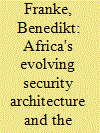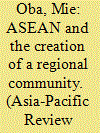|
|
|
Sort Order |
|
|
|
Items / Page
|
|
|
|
|
|
|
| Srl | Item |
| 1 |
ID:
083439


|
|
|
|
|
| Publication |
2008.
|
| Summary/Abstract |
Following decades of feeble attempts, Africa's states have recently made great strides in establishing an elaborate security architecture to tackle the continent's many perils. I argue that the emergence and particular structure of this architecture and its institutional layers are best described by the constructivist concept of multilayered security communities. While this concept is based on the original idea of security communities by Karl Deutsch and its later adaptation by Emmanuel Adler and Michael Barnett, it recognizes the increasing prominence of elaborate multi-level security cooperation in the developing world and the difficulties of the original theoretical framework to account therefor. Consequently, it combines security community terminology with notions such as organized complementarity and multi-level governance to do conceptual justice to systems like Africa's decentralized collective security arrangement.
|
|
|
|
|
|
|
|
|
|
|
|
|
|
|
|
| 2 |
ID:
117834


|
|
|
|
|
| Publication |
2012.
|
| Summary/Abstract |
This article provides a working taxonomy of the concept of 'alignment' in the discipline of International Relations (IR); a heretofore major deficiency in the otherwise abundant literature on alliance/alignment. It further contends that the label 'alliance' is commonly employed reflexively and unreflectively, where in fact the term 'alignment' would be a superior and more accurate descriptor. This contention is buttressed by empirical developments in international politics. The article makes the case that the contemporary security environment is characterised by multiple forms of 'alignment', not just alliances, in their many guises. In addition, we can identify 'coalitions', 'security communities', and 'strategic partnerships'; all distinctly different from the conventional 'alliance' archetype. It concludes that a change in our thinking about defining and conceptualising alignment and alliance is required to bring disciplinary work closer in line with the paradigmatic shift that is occurring in contemporary international politics.
|
|
|
|
|
|
|
|
|
|
|
|
|
|
|
|
| 3 |
ID:
131848


|
|
|
|
|
| Publication |
2014.
|
| Summary/Abstract |
After the ASEAN Concord II called for the building of an ASEAN Community in 2003, the creation of an ASEAN Community became a concrete part of the political agenda for the nations of Southeast Asia, and an ASEAN Community is scheduled to be created in 2015. However, it will all be for naught if the ASEAN Community that is established does not truly contribute to the stability and prosperity of the region. From this point of view, the article will attempt to evaluate the development of an ASEAN community concept and efforts to create it. To clarify the ideal of a true community, this article will take up Karl Deutsch's concept of "pluralistic security communities" and reconsider what a community requires. The article will state that the efforts to create an ASEAN Community should not be underestimated, and the blueprints for the creation of the ASEAN Community outline the formation of a true regional community. It will, however, conclude that in reality there exist factors within the ASEAN region that may shake the development of an ASEAN Community. It has to be said that the fostering of a sense of community at the level of ordinary people, as well as the creation of a community in which fundamental values and norms are shared, are distant propositions.
|
|
|
|
|
|
|
|
|
|
|
|
|
|
|
|
| 4 |
ID:
102754


|
|
|
|
|
| Publication |
2011.
|
| Summary/Abstract |
At first glimpse, the Communauté Financière Africaine (CFA) could be seen as an extraordinary example of the kind of economic and political leadership developed nations could establish in Africa. Dig deeper and the relationship France keeps with her former colonies shows evidence of chronic and endemic problems. By concentrating on the economic and geo-political gains the CFA has brought for the countries involved, this paper offers a pertinent evaluation of the nature, purpose and relevance of such Community, in light of two antagonistic theories of international relations: Pluralistic Security Communities and Dependency Theory.
|
|
|
|
|
|
|
|
|
|
|
|
|
|
|
|
| 5 |
ID:
147570


|
|
|
|
|
| Summary/Abstract |
Despite declaring the ASEAN Community to come into effect on 31 December 2015, ASEAN is not a security community. This article demonstrates this by firstly identifying three models of the security community, the Deutschian, the constructivist, and the instrumental models and subsequently applying these to ASEAN. Although the paradox of the ‘long peace’ of ASEAN seems to be validated by the latter, such is mistaking effect for cause. Through a process of critique, the shortfalls of the models are highlighted and consequently addressed through conjoining Critical Security Studies to the ‘security community’ concept in a Model IV critical security community formulation to achieve a holistic and comprehensive concept relevant to the world today. Employing this to assess ASEAN, the puzzle of whether ASEAN is a security community is laid to rest; its security is not truly comprehensive, its people are not emancipated, and its various domestic and transnational instabilities affect it adversely.
|
|
|
|
|
|
|
|
|
|
|
|
|
|
|
|
| 6 |
ID:
079044


|
|
|
|
|
| Publication |
2007.
|
| Summary/Abstract |
Borrowing from Norbert Elias, we introduce the habitus of restraint to the study of security communities. This habitus constitutes a key dimension of the glue that holds security communities together. The perceived compatibility of practices emanating from the habitus that members hold fosters the collective identity upon which a security community is built. The violation of a member's habitus by the practices of another member, however, disrupts the reproduction of collective identity and triggers a crisis of the security community. Our analysis of Germany's reaction to Washington's case for war against Iraq provides empirical evidence for the salience of the habitus for the internal dynamics of security communities
|
|
|
|
|
|
|
|
|
|
|
|
|
|
|
|
| 7 |
ID:
099919


|
|
|
|
|
| Publication |
2010.
|
| Summary/Abstract |
This article contends that the combined efforts of the ministries of foreign affairs and defence in nine countries of South and Central America, the G9, can be considered a nascent but not yet developed security community. Due to a growing capacity for crisis management which includes the search for political solutions to structural conflict and to political, economic and social deficits in Haiti, the article demonstrates that South American countries are developing a novel concept for post-conflict response. Finally, in the context of democratization, Argentina's participation in peace missions generates domestic elements strongly committed to peace operations.
|
|
|
|
|
|
|
|
|
|
|
|
|
|
|
|
| 8 |
ID:
082701


|
|
|
|
|
| Publication |
2008.
|
| Summary/Abstract |
This article invokes a combination of analytical and normative arguments that highlight the leading role of practices in explaining the expansion of security communities. The analytical argument is that collective meanings, on which peaceful change is based, cognitively evolve - i.e. they are established in individuals' expectations and dispositions and they are institutionalized in practice - because of communities of practice. By that we mean like-minded groups of practitioners who are bound, both informally and contextually, by a shared interest in learning and applying a common practice. The normative argument is that security communities rest in part on the sharing of rational and moral expectations and dispositions of self-restraint. This thesis is illustrated by the example of the successful expansion of security-community identities from a core of North Atlantic Treaty Organization (NATO) states to Central and Eastern European countries during the 1990s, which was facilitated by a `cooperative-security' community of practice that, emerging from the Helsinki Process, endowed NATO with the practices necessary for the spread of self-restraint.
|
|
|
|
|
|
|
|
|
|
|
|
|
|
|
|
|
|
|
|
|